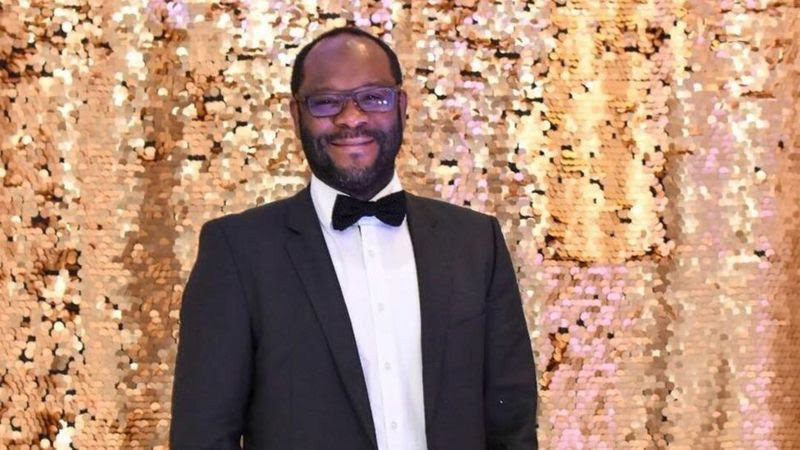
USA & CANADA (901)
Latest News
#EndSars: Hillary Clinton Tackles Buhari Over Killings of Young Protesters
Wednesday, 21 October 2020 04:12 Written by breezereportersHillary Clinton, former US secretary of state, has asked President Muhammadu Buhari to stop the killing of #EndSARS protesters.
Soldiers had invaded the Lekki toll gate area of Lagos earlier on Tuesday, shooting at unarmed protesters.
The incident had generated an uproar, within and outside the country.
In a tweet on Tuesday night, Clinton lend her voice in support of those who had condemned the action of the soldiers.
“I’m calling on @mbuhari and the @hqnigerianarmy to stop killing young #EndSARS protesters,” she tweeted.
Meanwhile, at least 42,000 individuals have signed a petition asking the United Kingdom to sanction the Nigerian government and public officials for human rights abuses over the #EndSARS movement.
The petition on the UK government and parliament website accused the government and the police of violating the rights of agitators protesting against police brutality.
It urged the UK to implement sanctions that allow “individuals and entities that violate human rights around the world to be targeted”.
“Deploying sanctions would provide accountability for and be a deterrent to anyone involved in violations of human rights,” it read.
The page noted that the petition, created on Tuesday and which can only be signed by British citizens and residents, will be considered in the UK parliament when it reaches its target of 100,000 signatures.
#EndSARS to #EndSWAT Equals Improve #Embassy and Consular Services.
Wednesday, 21 October 2020 03:52 Written by Francis JohnDiaspora Nigerians' Roles in Nation Building and Human Development:
Nigeria received $17.57 billion in direct diaspora remittances in 2019. According to data published by (@cenbank), remittances rose by 56.4% when it increased from $11.23 billion within the same period in 2018 to $17.57 billion in 2019. First published January 11, 2020 By Bamidele Samuel Adesoji - nairametrics.com
#EndSARS to #EndSWAT is a learning curve, spreading to every aspect of the non-performing Nigerian sector, not limited to Embassy and Consular Services.
Diaspora Nigerians Demanding:
· Operate open-door policies with ambassadors and consul generals
· Ambassadors and consul generals should hold a monthly phone-in or conference call program; Know your Citizens
· Decentralized and increase consular services, incorporate drop boxes at local post offices or courier firms
· Engage Diaspora Nigerian in proffering solutions
· Refund money for undelivered services
· Improve customer services and human relations
· Honor passport intervention invitation
· Respond to inquiries within 24 hours
· Facilitate Diaspora Voting Rights by 2023
· Complete Diaspora Nigerians Database
· Increase online presence and services
· Hire qualified staffs, no family members and friends
· Seek experts and volunteers where necessary
· Provide weekly feedback of services provided
· Apply for visas online and respond within 30 days
· Provide other optional and competitive payment services
· Perfect mail-in visa application
· Say No to passport booklets or out of stock
· Pay staffs prevailing wages
Passionate complementary commentaries:
· Learn how countries we are residing in are treating their citizenry
· Diaspora Nigerians will turn down nonperforming ambassadors
· Traces of negative incidences witnessed at embassies and consulates must stop with immediate effect, never will it that be condoled again by Nigerians in Diaspora
Diaspora International watchdogs are commencing, to take real-time situations of the Nigerian Embassies and Consular Services. To participate, contact: This email address is being protected from spambots. You need JavaScript enabled to view it. Caption - Embassy and Consular Services. Audiovisuals, articles, and photographs are accepted.
Francis John
TipsNews Publisher
End SARS: US Embassy shuts Consulate General, tells citizens what to do
Wednesday, 21 October 2020 01:05 Written by dailypostUnited States Embassy and Consulate in Nigeria has warned American citizens to avoid areas around protests and demonstrations.
The Embassy also urged the citizens to always check local media for updates and traffics advisories, while continue to be vigilant and avoid affected areas by the protests across the country.
The Embassy gave the warning in a press statement released on its official website on Tuesday.
Part of the statement read, “Multiple demonstrations are ongoing across Nigeria – to include areas within the consular districts of Abuja and Lagos.
“Although most demonstrations are peaceful, some have become violent and have shut down major thoroughfares and bridges. Some police stations have been targeted.
“Lagos State closed all schools indefinitely as of October 19 due to protests and implemented a 24-hour curfew starting at 4:00 p.m. on October 20.
“Consulate General Lagos is closed for the rest of today and tomorrow”.
The Embassy also urged US citizens to: Avoid the areas of the demonstration(d), exercise caution if unexpectedly in the vicinity of large gatherings or protests and keep a low profile.
Other precautionary measures as released by the embassy is for the citizens to be aware of their surroundings, monitor local media for updates as well as review the travel advisory for Nigeria.
In Toronto, Canada: Video Of Canadian Police Protecting #EndSARS Protesters
Tuesday, 20 October 2020 02:17 Written by tori
Video Of Canadian Police Protecting #EndSARS Protesters
A video has surfaced online showing the moment some Canadian police officers were seen protecting #EndSARS protesters kicking against police brutality.
The protesters had taken to the streets to lend their voices to the campaign against police brutality witnessed in Nigeria.
The police officers were seen guarding the protesters as they marched around the country.
Here Is The Video Below;
Popular News
First Black Canadian Minister Of Justice Reveals How His Cousin Was Murdered By Nigerian Police (Graphic Photo)
Sunday, 18 October 2020 14:49 Written by toriWhy Donald Trump's words work, and what to do about it
Sunday, 18 October 2020 14:09 Written by theconversation 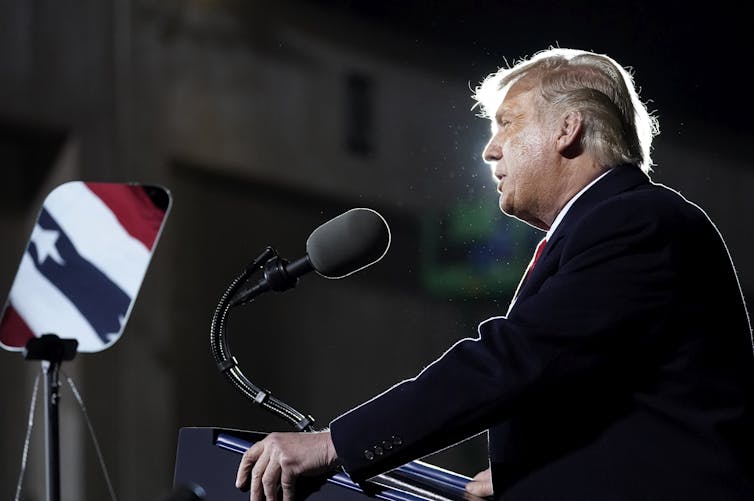
Robert Danisch, University of Waterloo
As America chaotically careens toward election day with President Donald Trump fighting a COVID-19 infection, we should stop and ask: Just why and how do Trump’s words work? And how does the recent confusion sown by his doctors at Walter Reed Medical Center amplify that work?
Perhaps more importantly: What can we do about it?
These questions strike at the core of a deep and persistent misunderstanding about communication. Too often people assume that communication is a matter of transmitting information from one place to another and that words simply carry meaning.
From this perspective, the president’s words function as a conduit from his head to everyone listening. With this president, we have all become accustomed to the concept of “misinformation,” whereby we recognize that intentionally false or misleading information is transmitted to the listener, and how it’s had a devastating impact during the COVID-19 pandemic.
We’ve also been awed by his use of Twitter to communicate that misinformation.
Trump rhetoric
The transmission model of communications describes the technical movement of a signal over a channel and across a distance. But this is a poor description of presidential rhetoric.
Too often we think that the complex, human task of communication is the same as the technical process of transmission. We worry whether someone “gets” our suggestions. When the president’s doctors update us on his health status, we assume that they’re just “giving” us information. “Giving” and “getting” are verbs of transmission.
Parsing the information transmitted by a president, determining whether it’s true or false or what’s really going on, is an ineffective way to understand what Trump’s words actually achieve. It doesn’t matter whether the information he transmits is accurate or inaccurate, and we make a mistake when we focus too much on accuracy and inaccuracy.
Then what to focus on?
What I and many others call the “rhetorical model of communication” suggests that words have impact, and that meaning is an outcome of the effects words produce. About 2,400 years ago, Gorgias, the famous sophist and democratic theorist, argued that words had a similar effect as drugs on the body. Ancient Athenian soothsayers would speak to the wounds of soldiers in battle in hopes that their words would heal.
So instead of asking whether a president’s rhetoric is true or false, instead of trying to interpret the information presented in order to receive an accurate sense of what Trump is really saying, we ought to start asking: What effect do the president’s words have on us? For example, what is the impact of his anti-mask mockery on his followers and on public health efforts to keep citizens safe?
Evoke strong reactions
Trump’s words are aimed at producing strong reactions. When he mocks mask-wearing, he knows that he’ll evoke a strong reaction from both the media and his followers, and he doesn’t seem to care about the accuracy of the information he’s transmitting. He knows that elections are not won or lost on policy ideas or rational voters making informed choices. They are won or lost on the basis of the effects produced by the candidate’s words.
Those effects drive us to the polls and motivate us to act and reason in specific ways.
I’ve taught rhetoric and communication classes for 20 years, and in almost every class, I begin by telling my students to pay more attention to the effects their words have on others and not the information they wish to convey. This president has surely mastered that lesson. He speaks with the intent of producing the strongest possible impact and cares not at all about the information transmitted.
There is no mistaking the intended effects of this president’s rhetoric. He aims to create feelings of resentment, distrust and suspicion. Mapping the world in terms of “us” and “them” creates conflict (and is perhaps the cornerstone of fascist rhetoric).
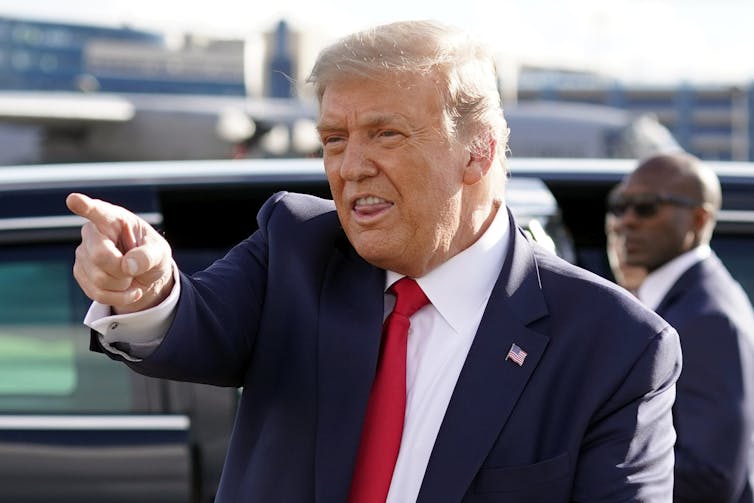
Conflict with those we resent and distrust drives attention — this is the ethos of the entertainment industry, reality television and thousands of years of theatre. Making us feel uncertain, anxious, fearful — this is what Trump’s words do, regardless of the information they transmit. The uncertainty created by his doctors at Walter Reed served this same function — they attracted attention via uncertainty.
The feelings Trump targets draw us in, make us pay attention to all of his transgressions and affect our relations with others who share our space. Attention is persuasion, because meaning is in the way we react to his words, not in the information he transmits.
Amplifying Trump’s rhetoric
Every time CNN or Fox News broadcasts the president’s news conferences, they amplify the effects by spreading them to larger audiences. Trump knows this, and yet our news outlets continue to let it happen.
Why?
Because dramatic tension fuels attention, and Trump’s words work to generate tension, anxiety, conflict and therefore attention. We could parse the rhetorical tactics that typically generate the strongest reactions and easily see them in Trump’s words (hyperbole, reification, ad hominem attacks, ambiguity). But we ought to focus more on how we react in order to limit his ability to persuade.
The president’s words right now are affecting all of us; they are driving us from one another and creating battle lines like the plot of a good drama.
Where are our soothsayers? Who will speak to our wounds in hopes of having the same affects as drugs on our bodies, like Gorgias believed?
Resistance to Trump requires changes in the way we react to his words. Like a parent who does not react to their children’s tantrums (which are designed to generate attention), we must react with neutrality and objectivity, not more insults or hyperbole.
To put it more succinctly: Saving democracy requires defying Trump’s words by reacting differently from what they typically prescribe or intend. We need to react with civility, care and calm to undo the cycle of attention and persuasion.
Robert Danisch, Associate Professor, Communications & Chair of Department of Communication Arts, University of Waterloo
This article is republished from The Conversation under a Creative Commons license. Read the original article.
Why Donald Trump's words work, and what to do about it
Sunday, 18 October 2020 14:09 Written by theconversation 
Robert Danisch, University of Waterloo
As America chaotically careens toward election day with President Donald Trump fighting a COVID-19 infection, we should stop and ask: Just why and how do Trump’s words work? And how does the recent confusion sown by his doctors at Walter Reed Medical Center amplify that work?
Perhaps more importantly: What can we do about it?
These questions strike at the core of a deep and persistent misunderstanding about communication. Too often people assume that communication is a matter of transmitting information from one place to another and that words simply carry meaning.
From this perspective, the president’s words function as a conduit from his head to everyone listening. With this president, we have all become accustomed to the concept of “misinformation,” whereby we recognize that intentionally false or misleading information is transmitted to the listener, and how it’s had a devastating impact during the COVID-19 pandemic.
We’ve also been awed by his use of Twitter to communicate that misinformation.
Trump rhetoric
The transmission model of communications describes the technical movement of a signal over a channel and across a distance. But this is a poor description of presidential rhetoric.
Too often we think that the complex, human task of communication is the same as the technical process of transmission. We worry whether someone “gets” our suggestions. When the president’s doctors update us on his health status, we assume that they’re just “giving” us information. “Giving” and “getting” are verbs of transmission.
Parsing the information transmitted by a president, determining whether it’s true or false or what’s really going on, is an ineffective way to understand what Trump’s words actually achieve. It doesn’t matter whether the information he transmits is accurate or inaccurate, and we make a mistake when we focus too much on accuracy and inaccuracy.
Then what to focus on?
What I and many others call the “rhetorical model of communication” suggests that words have impact, and that meaning is an outcome of the effects words produce. About 2,400 years ago, Gorgias, the famous sophist and democratic theorist, argued that words had a similar effect as drugs on the body. Ancient Athenian soothsayers would speak to the wounds of soldiers in battle in hopes that their words would heal.
So instead of asking whether a president’s rhetoric is true or false, instead of trying to interpret the information presented in order to receive an accurate sense of what Trump is really saying, we ought to start asking: What effect do the president’s words have on us? For example, what is the impact of his anti-mask mockery on his followers and on public health efforts to keep citizens safe?
Evoke strong reactions
Trump’s words are aimed at producing strong reactions. When he mocks mask-wearing, he knows that he’ll evoke a strong reaction from both the media and his followers, and he doesn’t seem to care about the accuracy of the information he’s transmitting. He knows that elections are not won or lost on policy ideas or rational voters making informed choices. They are won or lost on the basis of the effects produced by the candidate’s words.
Those effects drive us to the polls and motivate us to act and reason in specific ways.
I’ve taught rhetoric and communication classes for 20 years, and in almost every class, I begin by telling my students to pay more attention to the effects their words have on others and not the information they wish to convey. This president has surely mastered that lesson. He speaks with the intent of producing the strongest possible impact and cares not at all about the information transmitted.
There is no mistaking the intended effects of this president’s rhetoric. He aims to create feelings of resentment, distrust and suspicion. Mapping the world in terms of “us” and “them” creates conflict (and is perhaps the cornerstone of fascist rhetoric).

Conflict with those we resent and distrust drives attention — this is the ethos of the entertainment industry, reality television and thousands of years of theatre. Making us feel uncertain, anxious, fearful — this is what Trump’s words do, regardless of the information they transmit. The uncertainty created by his doctors at Walter Reed served this same function — they attracted attention via uncertainty.
The feelings Trump targets draw us in, make us pay attention to all of his transgressions and affect our relations with others who share our space. Attention is persuasion, because meaning is in the way we react to his words, not in the information he transmits.
Amplifying Trump’s rhetoric
Every time CNN or Fox News broadcasts the president’s news conferences, they amplify the effects by spreading them to larger audiences. Trump knows this, and yet our news outlets continue to let it happen.
Why?
Because dramatic tension fuels attention, and Trump’s words work to generate tension, anxiety, conflict and therefore attention. We could parse the rhetorical tactics that typically generate the strongest reactions and easily see them in Trump’s words (hyperbole, reification, ad hominem attacks, ambiguity). But we ought to focus more on how we react in order to limit his ability to persuade.
The president’s words right now are affecting all of us; they are driving us from one another and creating battle lines like the plot of a good drama.
Where are our soothsayers? Who will speak to our wounds in hopes of having the same affects as drugs on our bodies, like Gorgias believed?
Resistance to Trump requires changes in the way we react to his words. Like a parent who does not react to their children’s tantrums (which are designed to generate attention), we must react with neutrality and objectivity, not more insults or hyperbole.
To put it more succinctly: Saving democracy requires defying Trump’s words by reacting differently from what they typically prescribe or intend. We need to react with civility, care and calm to undo the cycle of attention and persuasion.
Robert Danisch, Associate Professor, Communications & Chair of Department of Communication Arts, University of Waterloo
This article is republished from The Conversation under a Creative Commons license. Read the original article.
Donald Trump, Hugo Chávez: Using illness for political gain and to erode democracy
Sunday, 18 October 2020 13:59 Written by theconversation 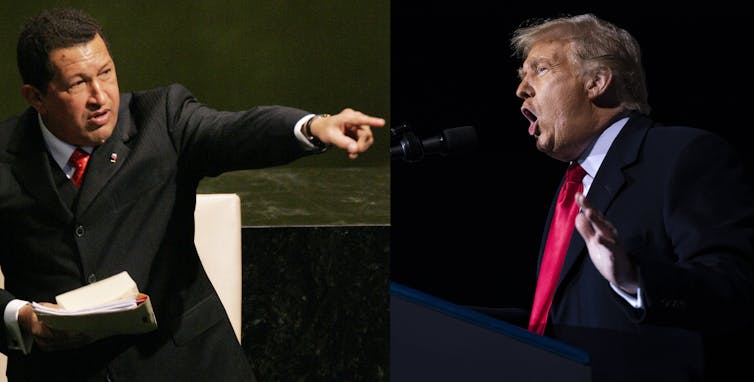
Isaac Nahon-Serfaty, L’Université d’Ottawa/University of Ottawa
An illness can be a grave moment for a political leader. It can be a time for discretion, or it can be a time for immense public exposure.
Winston Churchill, for example, preferred to keep his strokes secret in 1949, when he was head of the opposition, and in 1953 as British prime minister.
Others go for a bombastic manipulation of their ailments with the calculation of gaining momentum. With his COVID-19 infection, Donald Trump has chosen this option, as did the late president of Venezuela, Hugo Chávez, who died of cancer in 2012.
Both leaders represent two radical opposite ideologies. The conservative Trump is on the right of the political spectrum, while Chávez was on the far left. But the reality is much more nuanced than that.
Trump and Chávez express in their speeches and actions what I’ve defined as “grotesque transparency” — an excess of public disclosure that is so disruptive, it ends up dissolving the truth.
Read more: Dealing with the daily media dose of the grotesque
In this era of “ocular politics,” a leader’s physical appearance can become a focus of public attention. When the leader is no longer a physical representation of fitness and power, we often see two opposite attitudes from the media and the public. Either they want to confirm leaders are fit enough to fulfil their obligations as head of the government, or they want to prove that they’re the “fallen hero” who could not continue to carry the burden of the executive office.
Trump, as Chávez did when he was diagnosed with cancer, reacted to his COVID-19 infection by speeding up his return to the public stage and exaggerating — in action and rhetoric — his “total cure.”
The manipulation of magical thinking
Trump — again, just as Chávez did many times during his cancer ordeal — invoked supernatural intervention, calling his COVID-19 infection “a blessing from God that I caught it. This was a blessing in disguise.” He had the opportunity to ostensibly prove the efficacy of an experimental drug, Regeneron, and proclaimed:
“I want everybody to be given the same treatment as your president, because I feel great. I feel, like, perfect.”
The main difference between the Trump and Chávez cases is how each man presented himself physically to the public after their diagnoses.
Trump pushed for a quick release from the hospital, staging a heroic return to the White House. He climbed steps to the White House energetically, although with some breathing difficulties, did a military salute and, some days after, greeted people gathered below from the balcony of the presidential residence (something reminiscent of leaders like Argentinian General Juan Domingo Perón, the fascist dictator Benito Mussolini, Adolf Hitler and Chávez himself).
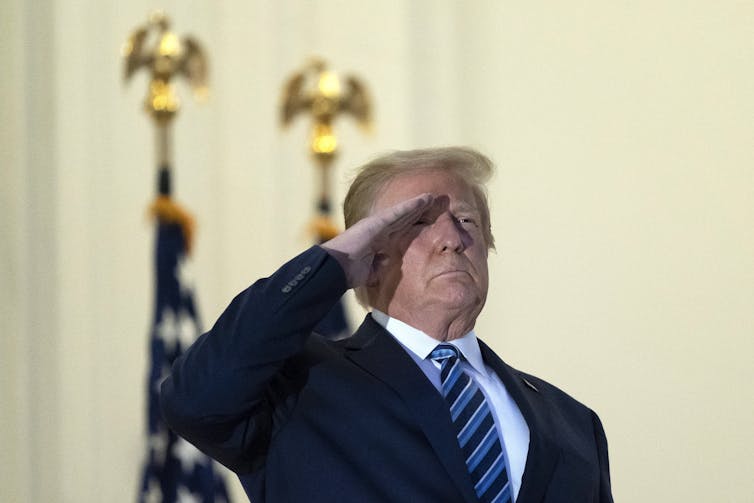
Chávez, on the other hand — particularly during the advanced stages of his cancer — presented himself as the suffering leader overcoming pain and frailty to plead to God for both a miraculous cure and victory in his last political battle — the presidential election of 2012.
But both leaders staged grotesque performances, using their diseases for political gain.
Trump transformed his COVID-19 infection into a campaign gimmick, disregarding all public health considerations and dismissing the seriousness of the pandemic.
Chávez used his cancer as an opportunity to compare himself to a suffering Christ carrying the cross, as well as assuming the role of the preacher during a Catholic Mass celebration.
Both leaders were careful to create the impression of “transparency” by suggesting to their supporters that they were disclosing all the details of their ailments and how they were confronting them.
The grotesque aspect of these performances — the desecration of democratic and religious conventions — enhances among their followers the impression of authenticity that Trump and Chávez sought to create as part of their political branding.
The broader dangers of grotesque transparency
Grotesque transparency affects people’s political decision-making and behaviour. These kinds of deceptive performances and speeches can be used as a prescription for radicalization, degradation of public civility, decline of democratic institutions and rituals, and even the justification of violence.
That’s why we should care about the use and abuse of this form of political communication in an era of superficial debates on social networks, social polarization and a culture more focused on visual images — reducing everything to a beautiful or shocking image — than it is on detailed and substantive arguments.
Populist leaders who manipulate this mode of communication fuel the suspension of reason, inflame those who are blindly partisan and produce “mutilated and confused ideas,” as the Dutch 18th-century philosopher Baruch Spinoza once said. Spinoza wrote in his treatise Ethics about “mutilated” ideas that cannot be articulated in a logical way, and are therefore “confused” because they tend to rely more on imagination than on reason — something both Trump and Chávez have used to their advantage.
Isaac Nahon-Serfaty, Associate Professor, L’Université d’Ottawa/University of Ottawa
This article is republished from The Conversation under a Creative Commons license. Read the original article.






